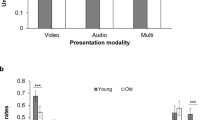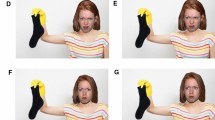Abstract
There is consistent evidence that older adults have difficulties in perceiving emotions. However, emotion perception measures to date have focused on one particular type of assessment: using standard photographs of facial expressions posing six basic emotions. We argue that it is important in future research to explore adult age differences in understanding more complex, social and blended emotions. Using stimuli which are dynamic records of the emotions expressed by people of all ages, and the use of genuine rather than posed emotions, would also improve the ecological validity of future research into age differences in emotion perception. Important questions remain about possible links between difficulties in perceiving emotional signals and the implications that this has for the everyday interpersonal functioning of older adults.
Similar content being viewed by others
References
Bucks, R. S., Garner, M., Tarrant, L., Bradley, B. P., & Mogg, K. (2008). Interpretation of emotionally ambiguous faces in older adults. Journal of Gerontology: Psychological Sciences, 63B, 337–343.
Calder, A. J., Keane, J., Manly, T., Sprengelmeyer, R., Scott, S., Nimmo-Smith, I., et al. (2003). Facial expression recognition across the adult life span. Neuropsychologia, 41, 195–202.
Ebner, N. C., He, Y. I., & Johnson, M. K. (in press). Age and emotion affect how we look at a face: Visual scan patterns differ for own-age versus other-age emotional faces. Cognition and Emotion.
Ebner, N. C., & Johnson, M. K. (2009). Young and older emotional faces: Are there age-group differences in expression identification an memory? Emotion, 9, 329–339.
Ebner, N. C., & Johnson, M. K. (2010). Age-group differences in interference from young and older emotional faces. Cognition and Emotion, 24, 1095–1116.
Ekman, P. (2007). Emotions revealed: Recognizing faces and feelings to improve communication and emotional life. New York: Henry Holt & Co.
Gross, J. J., Carstensen, L. L., Pasupathi, M., Tsai, J., Skorpen, C. G., & Hsu, A. Y. C. (1997). Emotion and aging: Experience, expression, and control. Psychology and Aging, 12, 590–599.
Gunning-Dixon, F. M., Gur, R. C., Perkins, A. C., Schroeder, L., Turner, T., Turetsky, B. I., et al. (2003). Age-related differences in brain activation during emotional face processing. Neurobiology of Aging, 24, 285–295.
Henry, J. D., MacLeod, M., Phillips, L. H., & Crawford, J. R. (2004). A meta-analytic review of prospective memory and aging. Psychology and Aging, 19, 27–39.
Henry, J. D., von Hippel, W., & Baynes, K. (2009). Social inappropriateness, executive control and aging. Psychology and Aging, 24, 239–244.
Hunter, E. M., Phillips, L. H., & MacPherson, S. E. (2010). Age benefits in emotion processing from integrating multimodal sensory cues. Psychology and Aging, 25, 779–787.
Insch, P., Bull, R. B., Phillips, L. H., Allen, R., & Slessor, G. (in press). Adult aging, processing style and the perception of biological motion. Experimental Aging Research.
Isaacowitz, D. M., & Stanley, J. T. (2011). Bringing an ecological perspective to the study of aging and recognition of emotional facial expressions: Past, current and future methods. Journal of Nonverbal Behavior. doi:10.1007/s10919-011-0113-6.
Krendl, A. C., & Ambady, N. (2010). Older adults’ decoding of emotions: Role of dynamic versus static cues and age-related cognitive decline. Psychology and Aging, 25, 788–793.
Malatesta, C. Z., Izard, C. E., Culver, C., & Nicolich, M. (1987). Emotion communication skills in young, middle-aged, and older women. Psychology and Aging, 2, 193–203.
Mather, M., & Carstensen, L. L. (2003). Aging and attentional biases for emotional faces. Psychological Science, 14, 409–415.
Murphy, N. A., Lehrfeld, J. M., & Isaacowitz, D. M. (2010). Recognition of posed and spontaneous dynamic smiles in young and older adults. Psychology and Aging, 25, 811–821.
Orgeta, V., & Phillips, L. H. (2008). Effects of age and emotional intensity on the recognition of facial emotion. Experimental Aging Research, 34, 63–79.
Phillips, L. H., Channon, S., Tunstall, M., Hedenstrom, A., & Lyons, K. (2008). The role of working memory in decoding emotions. Emotion, 8, 184–191.
Phillips, L. H., Scott, C., Henry, J. D., Mowat, D., & Bell, J. S. (2010). Emotion perception in Alzheimer’s disease and mood disorder in old age. Psychology and Aging, 25, 38–47.
Rabbitt, P. M. A., Maylor, E., McInnes, L., Bent, N., & Moore, B. (1995). What goods can self-assessment questionnaires deliver for cognitive gerontology? Applied Cognitive Psychology, 9, S127–S152.
Ruffman, T., Henry, J. D., Livingstone, V., & Phillips, L. H. (2008). A meta-analytic review of emotion recognition and aging: Implications for neuropsychological models of aging. Neuroscience and Biobehavioral Reviews, 32, 863–881.
Ruffman, T., Murray, J., Halberstadt, J., & Taumoepeau, M. (2010). Verbosity and emotion recognition in older adults. Psychology and Aging, 25, 492–497.
Slessor, G., Laird, G., Phillips, L. H., Bull, R., & Filippou, D. (2010a). Age-related changes in gaze following: Does the age of the face matter? Journal of Gerontology: Psychological Sciences and Social Sciences, 65, 536–541.
Slessor, G., Miles, L. K., Bull, R., & Phillips, L. H. (2010b). Age-related changes in detecting happiness: Discriminating between enjoyment and non-enjoyment smiles. Psychology and Aging, 25, 246–250.
Slessor, G., Phillips, L. H., & Bull, R. (2007). Exploring the specificity of age differences in Theory of Mind tasks. Psychology and Aging, 22, 639–643.
Slessor, G., Phillips, L. H., & Bull, R. (2008). Age-related declines in basic social perception: Evidence from tasks assessing eye-gaze processing. Psychology and Aging, 23, 812–822.
Stanley, J., & Blanchard-Fields, F. (2008). Challenges older adults face in detecting deceit: The role of emotion recognition. Psychology and Aging, 23, 24–32.
Sullivan, S., & Ruffman, T. (2004). Emotion recognition deficits in the elderly. International Journal of Neuroscience, 114, 403–432.
Sullivan, S., Ruffman, T., & Hutton, S. (2007). Age differences in emotion recognition skills and the visual scanning of emotion faces. Journal of Gerontology: Psychological Sciences, 62, 53–60.
Williams, L. M., Brown, K. J., Palmer, D., Liddell, B. J., Kemp, A. H., Olivieri, G., et al. (2006). The mellow years? Neural basis of improving emotional stability over age. The Journal of Neuroscience, 26, 6422–6430.
Zhang, X., Ersner-Hershfield, H., & Fung, H. H. (2010). Age differences in poignancy: Cognitive reappraisal as a moderator. Psychology and Aging, 25, 310–320.
Author information
Authors and Affiliations
Corresponding author
Rights and permissions
About this article
Cite this article
Phillips, L.H., Slessor, G. Moving Beyond Basic Emotions in Aging Research. J Nonverbal Behav 35, 279–286 (2011). https://doi.org/10.1007/s10919-011-0114-5
Published:
Issue Date:
DOI: https://doi.org/10.1007/s10919-011-0114-5




